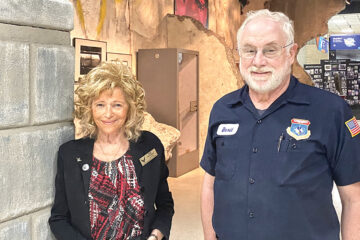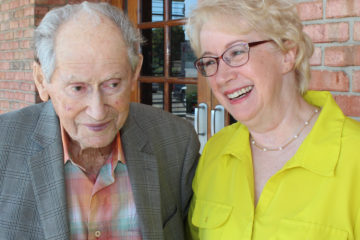A family’s treasures returned

By Jennie Szink, Special To The Dayton Jewish Observer
Well into her adult life, Karin Hirschkatz had only seen one picture of her father before he was in his 20s. She had rarely talked to her elder family members about their escape from Germany during the Nazi era. All of that changed one year ago when Karin’s 94-year-old aunt received a 70-year-old box.
Last May, Elsie Hirsch Levy, who lives in the St. Louis area, received a package from Buettelborn, Germany, her hometown before she fled to America in 1938. The package contained a box, and inside were items that were more than seven decades old: family photographs and nine pocket-sized Hebrew-German machzorim (holiday prayer books) printed in 1907.
Unknown to Elsie, her parents had given the box to a Christian neighbor, Marie Specht, for safekeeping before the Nazis deported them to Theresienstadt in Czechoslovakia in 1941.
Elsie’s parents — Karin’s grandparents — were later murdered in Auschwitz.
When Marie died in 1987, she left the box in the care of her daughter, Irma Bund. It was Irma’s son, Axel Bund, who opened the box and began the search for its owner.
He went to the Hirsch’s hometown to ask people if they could identify anyone, and Elsie’s grade school classmate, Marie Beisswenger, recognized Elsie’s parents. As it turns out, Elsie and Marie had actually been in contact for years before either knew about the box.
Elsie was stunned when she signed for the package; Karin was excited to see pieces of her father’s past.
“My aunt was extremely emotional when she received that box,” Karin said. “It brought back a lot of memories from her childhood, and not all were positive.”
Elsie is the sister of Karin’s father, Lou (Ludi) Hirsch, and another brother, Fred (Ferdie) Hirsch. By the time the siblings were in their late teens, German Jews were attempting to flee to America. Immigrants needed to have a sponsor, and Fred was the first to go. He then sent for Lou.
Elsie stayed in Germany to take care of her sick father, then her sick grandparents. Her brothers worked two to three jobs to make enough money to send for their sister and parents, Leopold Hirsch and Johanna Bruchfeld Hirsch.
“Unfortunately, their father was ill, and their mother would never leave without him,” Karin said. Her aunt moved to America when she was 21 in 1938 but Elsie’s parents stayed in Germany.
The contents of the box reminded Elsie of the life she escaped with the move.
Karin’s mother, Edith Hirsch, had also escaped from Nazi Germany, but she and Louis rarely spoke to their children about the experience.
Louis died in 1983 and Edith in 1993. For a long time, Karin had few relatives to ask about her parents’ early life. Now, the box helps her connect with her heritage.
“I’d only seen one picture — ever — of my father as a child,” she said. “When I saw the pictures from the box, I was able to see some of my son in him. And, when I saw pictures of his father, my grandfather, I could really see my Dad in him.”

Everything inside of the box was in good condition; it had remained unopened for seven decades. When Karin first saw the prayer books, she reveled at the gilt ornamentation on their spines and the covers.
Since the arrival of the box, Karin and her family have become connected to strangers in Germany.
In Europe, stolpersteine, a German word meaning “obstacle” or “stumbling block,” has gained a new meaning.
Now, the word describes small, cobble-sized memorials for people who were victims of the Nazis. An inscription stamped into brass on each memorial includes the person’s name, date of birth and fate, and the date of deportation and death, if known. These are placed near where they lived.
Karin’s father’s family was recently remembered with such plaques. Her sister flew to Germany for the ceremony, where they were placed in front of the home in which Elsie and her siblings grew up.
“I think the news of this ceremony has really helped my aunt cope with what happened,” Karin said. “Instead of the memorial reading, ‘died in Auschwitz,’ Elsie insisted they engraved ‘murdered in Auschwitz.’ ”
The box has helped Karin become closer to her father’s extended family and share pieces of him with her children. But she’s also left wondering why it was packed together in the first place. She’s also astonished by the good people can do.
“We don’t know if my grandparents knew they were going to a concentration camp or if my grandmother thought she’d be back for her belongings,” Karin said. “But, it’s amazing and it’s exciting that someone was determined enough to trace my family down and give these back to us.”





